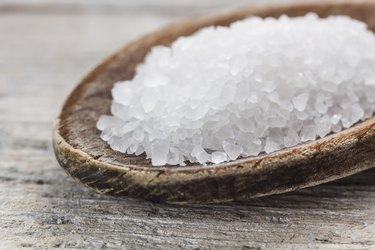
Although the composition of all salt types is 60 percent chloride and 40 percent sodium, the overall mineral content of salt can vary. Sea salt contains an abundance of minerals, which are chemical elements required by all living organisms. Even though your body needs dietary minerals in small amounts, they're crucial for good health. When deciding among sea, kosher or table salt, sea salt is the mineral-rich winner.
What Is Sea Salt?
Video of the Day
Sea salt, which is created by evaporating sea water, typically involves little or no processing and contains no anti-clumping additives, unlike table salt. Whether coarse or finely ground, it contains more minerals than other salts because it comes from the sea. The additional minerals in sea salt contribute to its color and flavor. Table salt is mined from underground salt deposits, and kosher salt is derived from either seawater or underground sources.
Video of the Day
Major Minerals
Your body needs minerals to function properly. They support your immune system and aid in your body's normal growth and development. Major minerals are minerals your body needs in quantities of 100 milligrams or more per day. Depending on the original source of seawater, major minerals found in sea salt include sodium, potassium, phosphorus and calcium. Sodium helps balance your body's fluids and is needed for proper muscle contraction. Potassium helps maintain a steady heartbeat and aids in transmitting nerve impulses. Phosphorus and calcium are crucial in the development and protection of strong bones and teeth.
Trace Minerals
Your body requires trace minerals in very small amounts. Depending on the source, important trace minerals found in sea salt include iron, iodine, manganese and zinc. Iron helps red blood cells and muscle cells carry oxygen throughout your body. Iodine is part of the thyroid hormone and aids in regulating your body's temperature. Manganese contributes to proper bone development, and it also aids in the metabolism of amino acids and carbohydrates. Zinc plays an important role in developing new cells and in healing wounds.
Salt Intake Considerations
Controlling sodium intake is one of the keys to maintaining heart health. Although sea salt may contain more minerals than table salt, it's not a low-sodium alternative to table salt, as some people mistakenly assume. According to the Centers for Disease Control and Prevention, current dietary guidelines for Americans recommend consuming no more than 2,300 milligrams of sodium per day. You should limit your sodium intake to no more than 1,500 milligrams per day, however, if you are over 51 years of age or you are African American, or if you have high blood pressure, diabetes or chronic kidney disease.
- Columbia University,Go Ask Alice!: What's the Difference Between Vitamins and Minerals?
- Columbia University, Go Ask Alice!: Sea Salt
- Harvard Health Publications: Listing of Vitamins
- The Cure Zone: Elements in Light Grey Celtic Sea Salt
- Centers for Disease Control and Prevention: Salt
- American Heart Association: Sea Salt vs. Table Salt